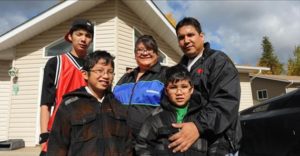Facing the unknown: Navigating EOA as an Aboriginal Housing Provider
“There’s this huge cloud of uncertainty,” says Eric Hill, Executive Director, Can-Am Urban Native Non-Profit Homes (CAUNH), in Windsor, Ontario.
Hill is referring to the new reality facing social housing providers in Ontario: the End of Operating Agreements (EOA). With three of CAUNH’s units already off of agreement, and the expiry of another agreement just around the corner (the year 2021), Hill says there are still so many unknowns. “There are promises that there will be some [government] assistance, but we don’t know what it is,” he says. “It makes it very difficult to plan.”
 Planning for EOA is certainly one of the greatest challenges social housing providers in Ontario have ever been confronted with. Urban Aboriginal providers like CAUNH face an additional hurdle. Aboriginal housing is not owned by the province or municipalities and has a funding model that always relied more heavily on federal subsidies that come through the Province and Service Managers. The loss of operating agreements may leave some housing providers with no viable options but to sell off units or move to market rent. The Aboriginal community – who is already over-represented in Canada’s homeless population – will be among the most impacted, as the model was designed to have a high proportion of rent-geared-to-income (RGI) units.
Planning for EOA is certainly one of the greatest challenges social housing providers in Ontario have ever been confronted with. Urban Aboriginal providers like CAUNH face an additional hurdle. Aboriginal housing is not owned by the province or municipalities and has a funding model that always relied more heavily on federal subsidies that come through the Province and Service Managers. The loss of operating agreements may leave some housing providers with no viable options but to sell off units or move to market rent. The Aboriginal community – who is already over-represented in Canada’s homeless population – will be among the most impacted, as the model was designed to have a high proportion of rent-geared-to-income (RGI) units.
According to Hill, CAUNH has already made a commitment not to sell off any of their 98 units. However, the number of units that can remain affordable and the number that will be forced to move to market rent is yet to be determined. Three of CAUNH’s units have already come off of their agreements, and Hill says this has given them a glimpse into what things might look like once the remainder of their stock reach EOA.
“We kind of have a picture of what it’s going to look like, but it’s not going to look the same for all of our units,” he says. “Some tenants may be able to maintain subsidies, but it will be under an entirely different agreement than what people are used to.”
With approximately 14% of Aboriginal housing units in Ontario already off agreement, and another 14% set to reach EOA within the next few years, CAUNH is not alone in their challenge. Planning years in advance is essential, and Hill says doing the necessary work to prepare has been helpful. “Things are starting to become clearer as we get closer to the day,” he says.
Here are few planning tips for housing providers approaching EOA:
1. Create a Communication Plan
Plan to communicate with your tenants in advance. CAUNH has put together a communication strategy to help guide their tenants through the upcoming changes, which they plan to implement within the next two years. As you draft your plan, list off all of the ways your tenants will be affected (this may differ from tenant to tenant) and be sure to address everything in your communications with them. Use plain language and provide definitions for terms that may be unclear.
2. Determine your baseline
“We almost have to operate under the assumption of – when [EOA] comes – we’re not going to have any subsidy whatsoever,” says Hill. While he admits this is a “pretty bleak baseline”, preparing for the organization’s “worst case scenario” helps to ensure a comprehensive plan.
While it is important to plan for the worst, there is still reason to remain hopeful. As part of its commitment to improve the Urban Aboriginal Strategy (UAS), the Province has created an engagement table to better meet the needs of urban Indigenous peoples. In addition, ONPHA’s Aboriginal Housing Advisory Committee continue to meet and advocate for better supports, including social, health and other economic supports direly needed by the Aboriginal population.
3. Talk to other housing providers
Housing providers do not need to operate in isolation. Many of the challenges of EOA are the same across the board, and sharing best practices with one another is critical in times of change. Meet with others, both formally and informally, and keep communication lines open.
4. Be an advocate
Hill encourages housing providers to connect with all potential supports. “We tend to work really well with our City and we have reached out to our MP,” says Hill.
ONPHA remains committed to advocating on behalf of our members. Contact us to let us know how you are dealing with EOA, what challenges you are facing or to share what strategies have worked for you.
416-927-9144 (Toll-free: 1-800-297-6660)




